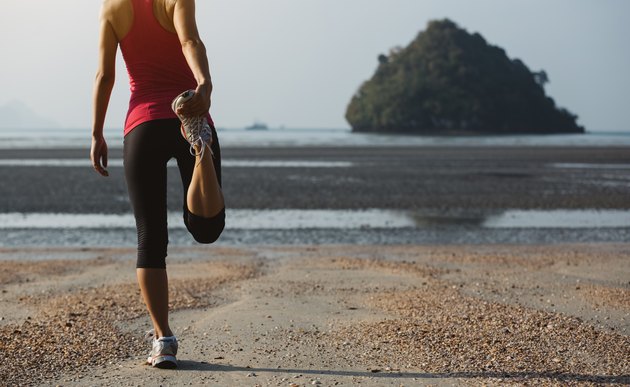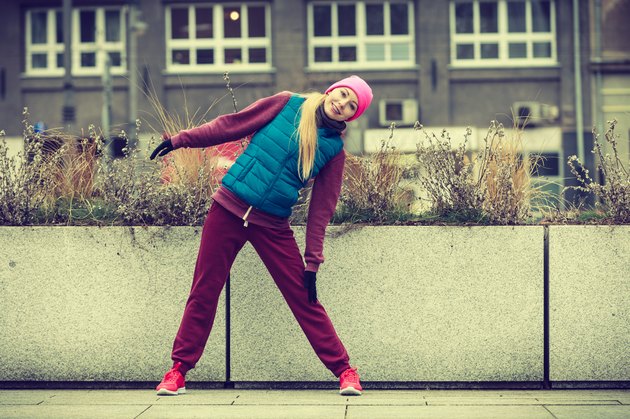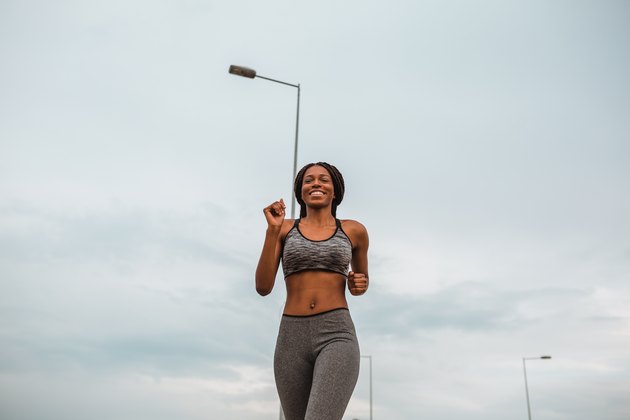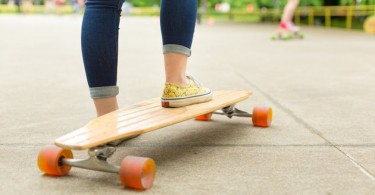As the weather heats up, you'll no doubt be spending more time outside. But depending on where you live, it might be a little too hot to head out for a run in the middle of the day.

Advertisements
Since summer running usually happens during the cooler parts of the day (early morning and late evening), that means there's less daylight and more chances for something to go wrong. So there's no better time to focus on keeping yourself safe.
Women especially need to consider their safety when taking to the streets or hills for their training. The numbers are alarming: According to the Rape, Abuse and Incest National Network (RAINN), the nation's largest anti-sexual assault organization, "One out of every six American women has been the victim of an attempted or completed rape in her lifetime."
But both men and women can arm themselves with the tips below to help reduce their chances of getting hurt while out for a run.
1. Carry or Wear a Light
Can't fit in your run until after sundown? Be sure to carry a small flashlight so you can always check out your surroundings. You'll not only be able to see cracks and gaps in the sidewalk or trail (or a loose wild animal) but any potential attacker lurking in the shadows. If a flashlight is too cumbersome, you can opt for a headlamp, and there are even flashlight apps for your smartphone.

2. Wear Proper Gear
It's equally as important that drivers and cyclists can see you as it is that you see them. Many companies are making reflective gear for runners. For instance, Nathan Sports make reflective vests, armbands and blinking lights that are easy to attach to your body or clothes.
Also, you may love running barefoot, but will you be able to take off in a full sprint if someone were chasing you? If you're a barefoot shoe wearer, consider using them during daylight hours and wearing running shoes with more support at night.
3. Don't Leave Home Without Pepper Spray
Contrary to popular belief, pepper spray is legal to carry in all 50 states. Check out Sabre Red's Runner Pepper Spray, which features an adjustable hand strap. If attacked, you can spray it in your assailant's face, making it very difficult for him to catch you as you sprint to safety.
4. If Needed, Sound the Alarm
If pepper spray isn't for you, a personal alarm attached to your key chain is an excellent way to stay protected. When approached by a potential attacker, pull the pin and an alarm will sound that can be heard up to 300 feet away.
Advertisements
However, this will only work if the threat of being caught scares off your attacker. If it doesn't, you'll want to look into self-defense training for times when you are left with no other option.

5. Turn Off Your Music After Dark
Even though music is one of the best motivators when it comes to an intense bout of cardio, it also drowns out one of your most important senses for alerting you to danger.
When your music is blasting, you can't hear a potential threat if he sneaks up right behind you. If you can't run without your headphones on, at least turn the music down so you will be able to hear what's happening around you.
6. Know Your Route (But Vary It)
Before you head out on your run, know where you're going. Don't attempt to take a new route for the first time at night. Instead, try it out during daylight so you can get to know all the cracks in the sidewalk and perhaps some of the people that live on the route. You'll also lessen your chances of getting lost this way.
And if you always run at the same time along the same route, try switching it up. Either run a little earlier or a little later, and have several go-to running routes you know are safe and rotate through those for each of your runs.
7. Take a Buddy (or Alert a Friend)
There's safety in numbers, so bringing along a friend means there's always someone to call for help if you get injured or to help you fight off an attacker. Plus, it's built-in motivation to keep you accountable.
If you can't bring someone along with you, at least let a friend or family member know that you're headed out for a run. That way, there's someone waiting to make sure you come home safely.
8. Learn Basic Self-Defense
Would you know what to do if someone grabbed you from behind? Or knocked you to the ground? Check into taking a self-defense class to equip yourself with some basic survival skills you'll hopefully never have to use.
What Do YOU Think?
What's your best safety tip? Do or would you go running alone at night? Why or why not? Do you feel safe when you are running, biking or working out outdoors? Leave a comment below and let us know!





Comments